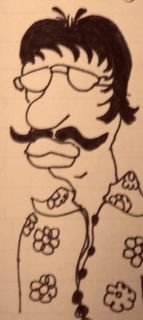Today I finished writing my last paper for Modern American Fiction. I chose to write about mass media in Richard Wright's Native Son and Thomas Pynchon's The Crying of Lot 49. Both were written in a time when new technologies allowed people to communicate on a stage larger than any of time before. Native Son was written in the 1940's and follows the character Bigger Thomas. A black man who, because of societal forces ends up committing several murderous acts. Thomas goes on the lamb and becomes obsessed with how he is being portrayed in the newspapers. The news media becomes a larger plot device when Thomas is updated on the status of the police's street-by-street search by reading the daily paper.
Now, as a modern reader, I wasn't really shocked by the notion that a killer would relish his "celebrity" status (created by the news media). Nor was I shocked by how Thomas was able to use what was reported to stay one step ahead of the police. Then I thought about when Native Son was written...and I became dumbstruck. The celebrity "cult" that we live in today was depicted accurately...decades before MTV and CNN. What's more, the idea that criminals could benefit from the coverage/interest in their crimes was also far ahead of it's time.
What does this tell us? For me, it says that people...no matter what the time period, are pretty much the same. Sure, there are some differences--but generally I don't think there is much difference between the average guy in 1940 and 2007. What has changed, however, is the technology that surrounds the average guy.
This brings me to the conversation I had with Leah in the car (on the way to Kohl's). Basically, I was telling her about my paper, and how the media was portrayed back in the 40's...and how similar it is to today--and I got to thinking. Wright wrote about complex social issues, Native Son is about racism more than it is the media...and yet, the newspapers play a vital role to the plot of the novel. Newspapers existed long before the 1940's, and yet it wasn't until the North American continent was "conquered" and covered with railroads (and other types of speedy transit) before they took such a central role in American life. As soon as the infrastructure was laid, newspapers flourished and became important not just as a source of valuable information (news) but also entertainment. Wright included this new media culture into his novel, he made it work for his plot...and at the same time was able to comment on the social aspect of print media.
Pynchon did the same thing (sorta) in The Crying of Lot 49. This time, though, Pynchon's 1963 novel focused not on the printed word--but the radio and that new wonder, television. Like Richard Wright, Thomas Pynchon included social commentary on a new form of media in his novel. Pynchon's novel deals with television and radio to take a few shots at something new that was occurring in the world (the formation of mass media as we know it today).
Where am I going with this? Well as we talked, I thought about the "digital age" we are now living in. Leah and I talked about getting on the net for the first time, and I realized how quickly all this has come about. Six months ago, I was pretty much non-existent on the web. Now...I know I'm not Matt Drudge or anything...but if you Google "Jawman" you're going to come up all sorts of interesting things related to me. Videos, blog entries, etc. This wasn't the case two years ago.
The question that I arrived at was: when will storytelling catch up with technology? What I mean is, when is someone going to write a novel that depends on the Internet. Let me explain. Native Son needs newspapers to function. You can't remove the word "newspaper" and insert a previous technology. Now, I point this out because I'm not stupid...I know there are countless stories out there that feature the Internet. But consider this popular example: YOU GOT MAIL (remember that film? With Tom Hanks and Meg Ryan). That was a REMAKE of a movie from the 30's or 40's!!! I must confess that I've only seen pieces of it, but THE SHOP AROUND THE CORNER isn't Sci-Fi (there was no Internet), instead the two lovers-to-be wrote each other letters. This is what I'm talking about. When will a story be told that actually uses the Internet and this digital age as more than modern dressing?
I'm sure some of you, especially those that read modern Science Fiction can name of countless hacker-type novels about computer people...and I guess that counts. But for some reason that just doesn't cut it for me. There's something--I don't know what exactly, that seems to be missing. Call it an "X Factor." Wright and Pynchon's novels told a good story (with an important social commentary) while at the same time also examined new trends in mass media. And I just don't think anyone today has hit upon that formula--done that job when it comes to the Internet. Perhaps it's because the Internet is still fairly new. After all, Pynchon and Wright's novels feature new...but not BRAND NEW forms of media. So for now, the culture of the Internet seems to be unrepresented in the realm of literature.
Subscribe to:
Post Comments (Atom)






1 comment:
Hmmm. Hyperfiction makes use of live links...
Also, John Dos Passos comes to mind in this vein--though that would be a generation before Richard Wright.
Post a Comment